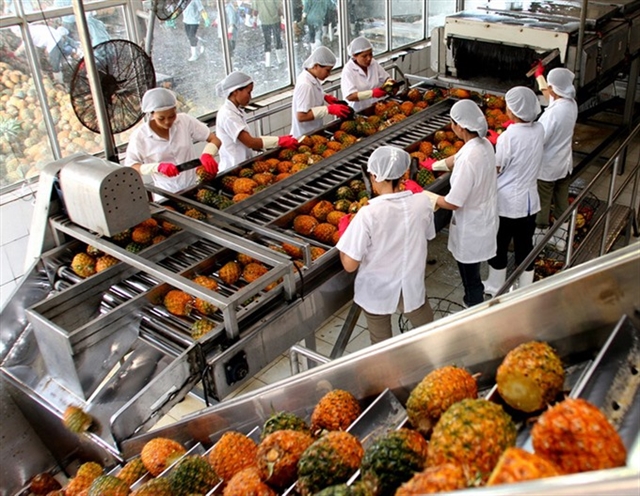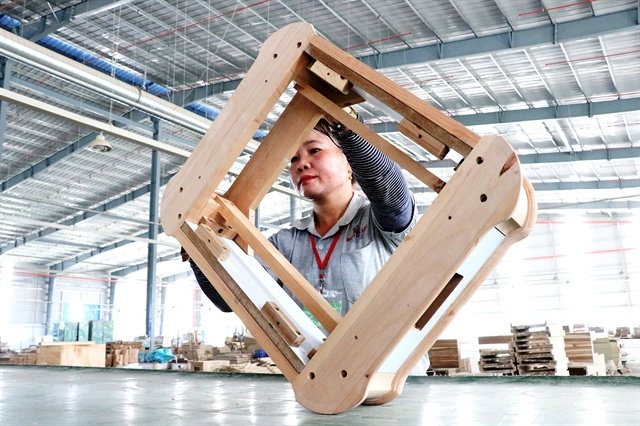This is a critical time to intensify efforts against origin fraud and illegal transshipment, as some foreign exporters have taken advantage of Việt Nam as a transshipment point to reroute goods and avoid trade remedies in third countries.

As pressure from US trade policies grows, particularly after US President Donald Trump announced reciprocal tariffs, stricter control over the abuse of origin labelling has become essential.
It helps safeguard domestic production and prevents the abuse of Việt Nam’s origin to evade tariffs through transhipment.
This is a critical time to intensify efforts against origin fraud and illegal transhipment, as some foreign exporters have taken advantage of Việt Nam as a transhipment point to reroute goods and avoid trade remedies in third countries.
The Ministry of Industry and Trade (MoIT) on April 10, 2025 dispatched an official dispatch to strengthen the management of imported materials used in the production of export goods.
“Việt Nam has always taken a proactive, open-minded approach and has worked closely with the US to negotiate fair trade policies, combat transhipment and promote mutually beneficial bilateral trade,” Deputy Prime Minister Hồ Đức Phớc said.
Pivotal role of ROO
Trịnh Thị Thu Hiền, deputy director of the Agency of Foreign Trade under MoIT, provided insights into the importance of Rules of Origin (ROO) and how they are applied in việt Nam.
According to Article 3(b) of the WTO Agreement on ROO, the country to be determined as the origin of a particular good is either the country where the good has been wholly obtained or, when more than one country is concerned in the production of the good, the country where the last substantial transformation has been carried out.
Determining the correct origin of goods plays a pivotal role in trade policies, as it forms the basis for applying preferential tariffs and trade measures to imported and exported goods. ROO is designed to ensure that only goods that truly originate from a particular country enjoy preferential tariffs under relevant trade agreements.
Hiền pointed out a common misunderstanding: the term 'origin' is not interchangeable with the label 'Made in Việt Nam'. For example, clothing labelled 'Made in Việt Nam' might not have a Vietnamese Certificate of Origin (C/O), and vice versa - a shipment with a Vietnamese C/O might not carry the 'Made in Việt Nam' label.
In recent years, the Agency of Foreign Trade has consulted and developed regulatory frameworks to ensure clarity and transparency in origin-related matters. This includes clear provisions for organisations authorised to issue C/Os and penalties for origin fraud, which are highly focused.
The agency also regularly coordinates with C/O-issuing bodies to provide training, enhance professional capacity and offer timely guidance to businesses on the origin of goods.
MoIT works closely with the authorities of importing countries upon request for origin verification. This process helps detect cases where goods are simply minimally processed in Việt Nam to exploit preferential treatment.
Conversely, when goods meet the origin requirements, the agency supports businesses in verifying origin to ensure their C/Os are accepted and eligible for tariff preferences.
MoIT also prioritises consultations and negotiations on origin rules aligned with Việt Nam’s actual production processes and enterprise capabilities. Administrative procedures are being reformed while digital platforms are used to improve efficiency in handling C/O applications and business inquiries related to origin matters.

Greater transparency needed
Experts have noted that the US’s new tariff policies pose significant challenges to Vietnamese enterprises, as origin rules are expected to become more stringent, requiring higher domestic content in exported goods.
This shift could increase production costs and place pressure on several export sectors in Việt Nam.
It is essential for businesses to ensure full compliance with origin regulations and maintain traceability of their goods, thereby also creating opportunities for greater use of domestic materials.
According to Nguyễn Mạnh Hùng, an expert in supply chain management and logistics, traceability within the supply chain is crucial for proving the authenticity of Vietnamese products and differentiating them from those of other countries.
This is especially important as the US and other global markets are increasingly scrutinising transhipment activities. Goods can be repackaged or relabelled in Việt Nam to avoid tariffs imposed on third-country products.
MoIT has previously released an early warning list of 17 export product categories from Việt Nam to the US that are at risk of trade remedy investigations due to concerns over origin fraud and illegal transhipment.
Nguyễn Thường Lạng, a senior lecturer at the School of Trade and International Economics, National Economics University, has warned that the US has a trade monitoring system and possesses legal tools to penalise origin fraud or tariff circumvention.
If goods are found to have been transshipped or falsely labelled to evade trade defence measures, the US may impose punitive tariffs. It could eliminate any competitive advantage of the affected goods. This is a risk that Vietnamese businesses need to identify and have appropriate prevention plans for.
Việt Nam needs greater transparency in production processes and to achieve a higher degree of localisation in exporting products to the US, according to Lạng.
This requires enterprises to tightly control their supply chains and ensure that their products have enough domestic added value to avoid being classified as goods originating from a third country.
Việt Nam can also encourage investment from third countries to focus on full-scale production within the country, rather than merely importing components and input materials. This would help raise the localisation rate, increase domestic production value and reduce the risk of anti-circumvention measures from the US.
Đinh Hồng Kỳ, vice chairman of the HCM City Union of Business Association, highlighted the need to thoroughly review foreign direct investment (FDI). According to him, it is important to enhance accountability in project appraisal, tighten oversight mechanisms, and prevent the approval of outdated or polluting technologies.
"Việt Nam should proactively attract investment projects with higher added value while limiting those that merely engage in basic processing," Kỳ added.
One furniture exporter in Hải Dương Province said that although the company had been exporting to the US for over a decade, it now faced greater pressure to ensure transparent traceability documentation.
Despite designing and manufacturing the products domestically, with timber sourced from Yên Bái Province and paint from Bắc Ninh Province, partners recently requested additional proof that all products are genuinely made in Việt Nam.
This heightened scrutiny stems from concerns that Việt Nam may be used as a transhipment point to circumvent tariffs imposed on third countries.
In response, alongside the critical strategy of diversifying export markets, several businesses in Hải Dương have begun implementing digital logs. These tools help track the entire production process, from sourcing raw materials to final processing, with strict input control from the outset. VNS BIZHUB





